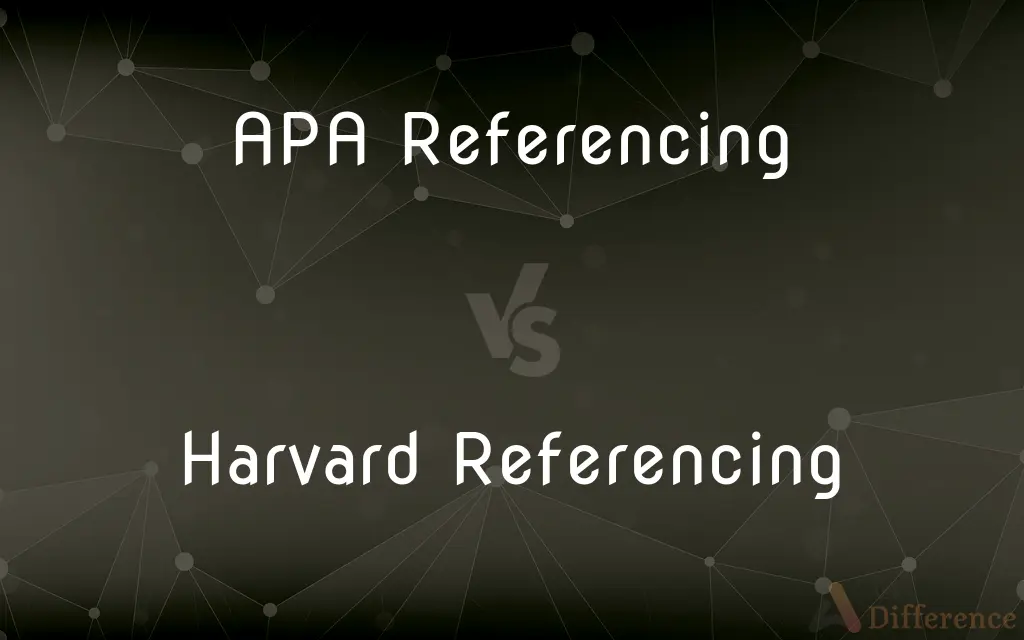APA Referencing vs. Harvard Referencing — What's the Difference?
By Fiza Rafique & Urooj Arif — Published on February 22, 2024
APA referencing involves specific guidelines for citing sources in social sciences, emphasizing author and publication year. Harvard referencing, a variant of the author-date system, is more flexible and uses author name and publication year in citation.

Difference Between APA Referencing and Harvard Referencing
Table of Contents
ADVERTISEMENT
Key Differences
APA Referencing and Harvard Referencing are two prominent citation styles adopted in academic writing to credit sources and avoid plagiarism. While they share similarities, particularly in using the author-date format for in-text citations, they differ in formatting details, application, and reference list presentation.
APA Referencing, established by the American Psychological Association, is widely used in psychology, education, and other social sciences. It prescribes specific rules for in-text citations, including the author's last name, publication year, and page number for direct quotes. The reference list entries must include authors' names, publication years, titles, and publication information, with specific formatting rules for different types of sources. APA style also provides guidelines for paper formatting, abstracts, and headings.
Harvard Referencing is not associated with a specific publisher or institution but refers to a generic author-date citation system. Its main principles include citing authors' last names and publication years in the text and providing a reference list with full details of each source. However, Harvard referencing allows for more flexibility in the presentation of source information and does not prescribe a singular set of formatting rules. Different universities and publications may have their own variations of Harvard style, adjusting it to suit their preferences.
Both referencing styles aim to provide clear, consistent methods for citing sources, enabling readers to locate the referenced works. The choice between APA and Harvard often depends on the disciplinary context, publication requirements, or institutional guidelines.
Comparison Chart
Origin
American Psychological Association
Generic author-date system, no specific origin
ADVERTISEMENT
Disciplines
Psychology, education, and social sciences
Used across various disciplines
In-text Citation
Author's last name, year, page number for quotes
Author's last name, year, flexible with page number
Reference List Entry
Authors' names, publication year, title, publisher
Similar, but format may vary by institution
Formatting Rules
Specific guidelines for headings, abstracts, and layout
More flexible, varies by institution
Page Number in Citation
Required for direct quotes
Often optional unless directly quoting
Common Usage
Academic journals, research papers in social sciences
Academic work across disciplines, especially in the UK and Australia
Compare with Definitions
APA Referencing
A structured method for citing sources in social sciences.
(Smith, 2020, p. 15) for direct quotes.
Harvard Referencing
Used widely across different disciplines.
Preferred in humanities and natural sciences as well.
APA Referencing
Specific rules for electronic source citation.
Include DOI or URL for online articles.
Harvard Referencing
A flexible author-date citation system.
(Smith, 2020) is commonly used for in-text citations.
APA Referencing
Emphasizes the year of publication in citations.
Recent studies (Johnson, 2019) have shown...
Harvard Referencing
Allows for variation in reference list presentation.
Smith, J. (2020) Title of the work, Publisher.
APA Referencing
Detailed guidelines for reference formatting.
Smith, J. (2020). Title of the Work. Publisher.
Harvard Referencing
Adapted internationally with local variations.
Australian Harvard includes the city of publication in references.
APA Referencing
Requires a running head on each page.
A shortened title as the header in APA papers.
Harvard Referencing
Varies by institution in specific details.
Some universities prefer citing page numbers for all in-text citations.
Common Curiosities
Is APA referencing only for psychology and education?
Primarily, but its use extends to other social sciences and any field that prefers its detailed citation style.
How do I know if my institution uses Harvard referencing?
Check your institution's academic writing guide or consult with instructors, as practices may vary.
Are in-text citations the same in APA and Harvard referencing?
They are similar but not identical; APA often requires the inclusion of page numbers for direct quotes, while Harvard's requirements can vary.
Is one referencing style better than the other?
No, the choice depends on the disciplinary context, purpose of the work, and specific requirements of publishers or institutions.
How does APA handle the citation of electronic sources?
APA requires the inclusion of DOIs or URLs for electronic sources, with specific formatting rules.
How do I cite a source with no author in APA and Harvard?
In APA, use the title of the work and publication year. In Harvard, the approach is similar, but the format may vary slightly depending on the institutional guidelines.
Why choose APA over Harvard referencing?
Choose APA for strict adherence to guidelines in social sciences and when the publication or institution specifically requires it.
Can referencing styles change over time?
Yes, both APA and Harvard guidelines can be updated, so it's important to refer to the most recent version.
What's a major difference in the reference list between APA and Harvard?
The major difference lies in the flexibility; Harvard allows for variations, while APA has strict formatting rules.
Can I use Harvard referencing for scientific papers?
Yes, Harvard referencing is adaptable and can be used across various disciplines, including the sciences.
Share Your Discovery

Previous Comparison
Synchronous DRAM vs. Asynchronous DRAM
Next Comparison
Metals vs. MetalloidsAuthor Spotlight
Written by
Fiza RafiqueFiza Rafique is a skilled content writer at AskDifference.com, where she meticulously refines and enhances written pieces. Drawing from her vast editorial expertise, Fiza ensures clarity, accuracy, and precision in every article. Passionate about language, she continually seeks to elevate the quality of content for readers worldwide.
Co-written by
Urooj ArifUrooj is a skilled content writer at Ask Difference, known for her exceptional ability to simplify complex topics into engaging and informative content. With a passion for research and a flair for clear, concise writing, she consistently delivers articles that resonate with our diverse audience.














































